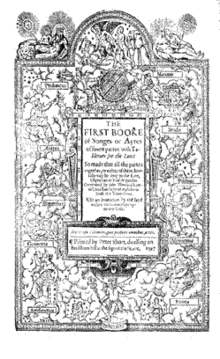
"Come Again, sweet love doth now invite" is a song by John Dowland. The lyrics are anonymous. The song is bitter-sweet, typical of Dowland who cultivated a melancholy style.[1]
It was included in Dowland's First Booke of Songes or Ayres, which appeared in 1597. The piece is often performed as a lute song by soloist and lute, but, like other songs in the First Booke, it is printed in a format that can also be performed as a madrigal by a small vocal group (typically SATB).
The first two verses are addressed to the lover. The later verses speak to the reader about the lover, and the singer's thoughts. In the first verse, the words "to touch, to kiss, to die, with thee again in sweetest sympathy" use the Elizabeth euphemism of "dying" for experiencing orgasm, literally, "come again! sweet love". But the poet's later thoughts shift to ideas of actual death, dying "in deadly pain". His love is unrequited, so he asks "Love", that is "Eros" or "Cupid" to withdraw his "wounding dart" that inspires a person to love.
- ^ Wells, Robin Headlam. "John Dowland and Elizabethan Melancholy," Early Music, Vol. 13, No. 4. November 1985, pp. 514–28.